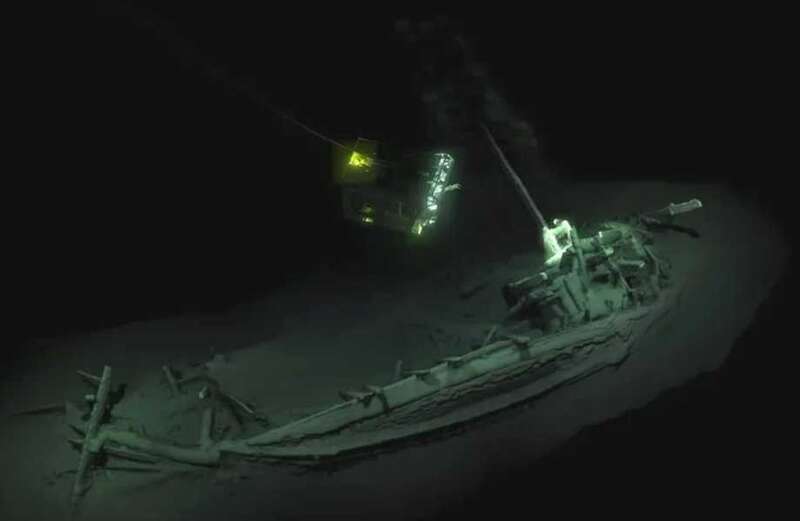THE world's oldest shipwreck has been perfectly preserved more than a mile under the sea for 2,400 years.
The Greek trading vessel was discovered in an astonishing state of preservation in the Black Sea off the Bulgarian coast and has been dated back to 400BC.



Found lying on its side by an Anglo-Bulgarian team in late 2017, the 75ft structure is officially the world's oldest known intact shipwreck.
Despite thousands of years isolated almost 1.25 miles beneath the surface, the rudder, rowing benches and even the contents of its hold are as they were.
That's thanks to the lack of oxygen at those depths, meaning organic material can be preserved for thousands of years.
 Baffled workers find extraordinary ancient shipwreck in quarry 300mtrs from sea
Baffled workers find extraordinary ancient shipwreck in quarry 300mtrs from sea
It was discovered as one of 65 ship wrecks by the Black Sea Maritime Archaeology Project (Black Sea MAP), who used advanced mapping technology to survey more than 2,000 sq km of seabed.
Also found was a 17th century Cossack raiding fleet and Roman trading vessels complete with amphorae.
But the Greek merchant ship is of a kind only previously seen on the side of ancient Greek pottery, such as the 'Siren Vase' in the British Museum.
Dating back to around 480 BC, the vase shows Odysseus strapped to the mast as his ship sails past three mythical sea nymphs whose tune was thought to drive sailors to their deaths.
A small piece of the vessel was taken following its discovery to be carbon dated by the research team, which confirmed the ship to be at least 2,400 years old.
A member of the expedition, Helen Farr, described the wreckage as something from "another world".
She told the BBC: "It's when the ROV [remote operated vehicle] drops down through the water column and you see this ship appear in the light at the bottom so perfectly preserved it feels like you step back in time."
Lying more than 2,000m below the surface, the wreckage is also beyond the reach of modern divers.
"It's preserved, it's safe," Farr added. "It's not deteriorating and it's unlikely to attract hunters."
Also involved in the expedition was an international team of scientists led by University of Southampton experts.
 Huge Viking hall discovered in 'biggest find' in more than a decade
Huge Viking hall discovered in 'biggest find' in more than a decade
Jon Adams, Professor of Archaeology at the institution, is Black Sea MAP’s principal investigator.
He said the discovery of an intact ship from the Classical world is something he never believed was possible.
"This will change our understanding of shipbuilding and seafaring in the ancient world," he told the university's website.
The University worked with the National Institute and Museum of Archaeology, and the Centre of Underwater Archaeology, both in Bulgaria, on the project.
The ships cargo remains unknown, however,
The research team said more funding would be needed if they are to return to the site.
"Normally we find amphorae (wine vases) and can guess where it's come from, but with this it's still in the hold," said Dr Farr.
"As archaeologists we're interested in what it can tell us about technology, trade and movements in the area."
Experts have also spent decades hunting for one of the world's most valuable shipwrecks that could have £1billion in gold onboard.
Dubbed the "El Dorado of the Sea" an English ship named the Merchant Royal sank off the coast of Cornwall leaving behind an incredible amount of riches.
And last year, a never-before-seen 17th century shipwreck was discovered.
The ship carried future Kings of England and was found buried in the sand, untouched for 350 years.







































